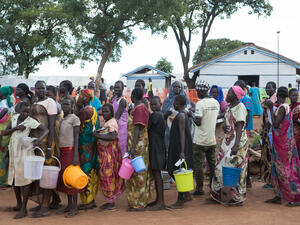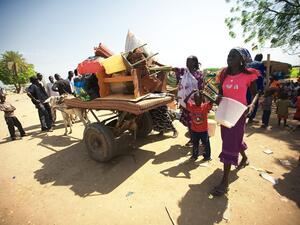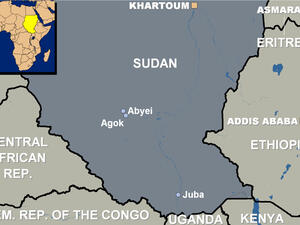UNHCR emergency teams bolster repatriation efforts in South Sudan
UNHCR emergency teams bolster repatriation efforts in South Sudan

The 18 UNHCR emergency specialists step off a special charter flight in Juba, South Sudan.
JUBA, South Sudan, November 16 (UNHCR) - The UN refugee agency has sent three emergency teams to open new offices in the eastern part of South Sudan, as part of its effort to boost preparations for the possible return of hundreds of thousands of Sudanese refugees living in camps in Ethiopia and Kenya,
The 18 team members are expected to open offices in Bor, Kapoeta and possibly Nasir, if that area proves safe enough for refugees to come home after the 21-year civil war officially ended last January.
Bor, which is located in the Jongley region, 140 km north of Juba, is the new administrative centre for south Sudan, and will be the site of the first new office. One of the UNHCR teams - a programme officer, a protection officer and an administration staffer - plans to fly to Bor on Friday.
"There is absolutely nothing there," says Bernard Kerblat, leader of the three teams and overall Deputy Operations Manager. That means UNHCR staffers will have to take with them everything they need - mats, camping beds, stoves, tables, benches, first aid kits, water purifiers - to tide them over the first few days.
A top priority for the Bor team will be to examine - and, if necessary, repair - the airstrip so it can receive a larger plane with additional equipment to set up a fully functioning office.
The 18 members of the three UNHCR emergency teams arrived in Juba on Tuesday on a chartered ATR-72. A second aircraft, an Ilyushin-76, brought in 38 tonnes of telecommunications and accommodation equipment for the new offices.
In Bor, the UN refugee agency also plans to establish close contacts with the local authorities and population, as well as with the few non-governmental organizations already on the ground, in order to better plan for the return of Sudanese refugees who have spent decades outside their own country, or in many cases were born in exile.
A top priority is organizing "go-and-see" visits to Bor for Sudanese refugees currently living in Kakuma camp in north-western Kenya. The decision to repatriate is a major one, and this type of visit is often used as a way to let refugees themselves assess conditions back home before making an informed decision about whether or not to leave their camps once and for all in order to rebuild their lives in their own countries.
But before launching such initiatives, UNHCR needs to go through the more prosaic processes of setting up an office and hiring local staff to liaise with the refugees and returnees.
"It seems like a mountain of work to accomplish," says Claas Morlang, the future team leader in Bor, who for the time being is still acclimatizing in Juba with the rest of the team.
"But this is a new adventure, a new challenge and I think that if we tackle all the issues one by one, a lot can be done in two months," he adds. UNHCR sends emergency teams for two months, after which they are replaced by longer-term staff.
"In two months, the team will be able to lay the foundation for a decent UNHCR presence in the eastern corridor," says Kerblat.
Flexibility is a trait the team will need in South Sudan: plans to open an office in Nasir, for example, are changing by the minute. "For the moment, this is on hold as there have been recent worrying security incidents," explains Kerblat, a veteran of 24 years of refugee operations, including emergencies in Afghanistan, Pakistan, Timor, Angola, Mozambique, Liberia, Sierra Leone and Albania.
A planned repatriation of refugees from Mboki camp in the Central African Republic has already been put on hold because of interethnic violence in the Tambura area of South Sudan where they were supposed to return.
This means refugees from camps in Ethiopia and Kenya may now be the first to come home under the UNHCR-organized repatriation programme, although no firm date has been set. In all, there are some 500,000 Sudanese refugees in neighbouring countries, with a further four million people displaced inside Sudan itself, who could potentially return home over the next few years.
Prior to the new deployment, UNHCR had already opened offices in the southern Sudan towns of Rumbek, Juba, Yei, Kajo Keiji, Yambio, Tambura, Malakal, and Damazin. Despite the importance of the operation, which - if successful - would bring an end to one of the world's most deadly and enduring crises, UNHCR's South Sudan operation remains seriously underfunded: by November, the agency had received only $39 million out of the $76.3 million it had budgeted for operations in 2005.
By Hélène Caux in Juba, South Sudan







